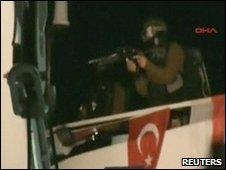Activists describe Israeli raid on Gaza aid convoy
- Published
Passengers on board the Gaza-bound aid flotilla give their accounts of what happened when Israeli commandos boarded the ships, killing nine.
The activists, speaking on their return home, said as well as firing live and plastic rounds, commandos had administered electric shocks and beaten passengers during the assault.
Israeli soldiers have said the troops acted in self-defence after they were attacked while boarding the Turkish ship, the Mavi Marmara, the largest of the six ships in the convoy.
BULENT YILDRIM, TURKEY
Bulent Yildrim is head of the Istanbul-based Foundation for Human Rights and Freedoms and Humanitarian Relief (IHH), which organised the flotilla.
Upon his arrival back in Turkey, he admitted some of the activists had grabbed the guns off soldiers in self-defence.
"Yes, we took their guns. It would be self-defence even if we fired their guns. We told our friends on board: 'We will die, become martyrs, but never let us be shown... as the ones who used guns'. By this decision, our friends accepted death, and we threw all the guns we took from them into the sea."
He described how a doctor and a journalist were both shot at close range, and said another activist was shot as he was surrendering.
"I took off my shirt and waved it, as a white flag. We thought they would stop after seeing the white flag, but they continued killing people," he said.
NORMAN PAECH, GERMANY

Israel says its troops acted in self-defence
Norman Paech, a former member of Germany's Left Party, was aboard the Mavi Marmara.
Speaking at a news conference in Berlin, he said the ship was surrounded by small Israeli assault boats on Monday morning at about 0430 local time.
"Moments later, we heard detonations and then soldiers from helicopters above us dropped down on board.
"The soldiers were all masked, carrying big guns and were extremely brutal."
Mr Paech said he only saw three activists resisting.
"They had no knives, no axes, only sticks that they used to defend themselves," he told reporters.
But he said he could "not rule out" that others used weapons somewhere else on the boat.
NILUFER CETIN, TURKEY
Turkish activist Nilufer Cetin told reporters she hid with her baby in the bathroom of her cabin aboard the Mavi Marmara.
"When the Mavi Marmara continued on its course, the harassment [from Israeli ships] turned into an attack," she said.
"They used smoke bombs followed by gas canisters. They started to descend on to the ship with helicopters.
"It [the violence] was extremely bad and brutal. The ship turned into a lake of blood.
"I was one of the first victims to be released because I had a child. They confiscated everything, our telephones, laptops are all gone.
"We were aware of the possible danger [in joining the trip] but there are thousands of babies in Gaza. If we had reached Gaza we would have played with them and taken them food."
DIMITRIS GIELALIS, GREECE
Activist Dimitris Gielalis, who had been aboard the Sfendoni, was among six Greeks who returned home on Tuesday.
"Suddenly from everywhere we saw inflatables coming at us, and within seconds fully equipped commandos came up on the boat," he said.
"They came up and used plastic bullets, we had beatings, we had electric shocks, any method we can think of, they used."
Mr Gielalis said the boat's captain was beaten for refusing to leave the wheel, and had sustained non-life-threatening injuries, while a cameraman filming the raid was hit with a rifle butt in the eye.
"Of course we weren't prepared for a situation of war," he said.
ARIS PAPADOKOSTOPOULOS, GREECE
Aris Papadokostopoulos was aboard the Free Mediterranean, travelling behind the Mavi Marmara and carrying mainly Greek and Swedish activists.
"The Turkish ship [the Mavi Marmara] was in front of us... on which there was a terrible raid from the air and from the sea and from everywhere, with shooting," he said.
Mr Papadokostopoulos said aboard the other boats, commandos beat activists but nobody was gravely injured.
He said no-one put up resistance on the Free Mediterranean, which was carrying a cargo of wheelchairs, building material and medical and pharmaceutical aid.
"Some people were hit by clubs and electric shocks. During their interrogation, many of them were badly beaten in front of us," he said.